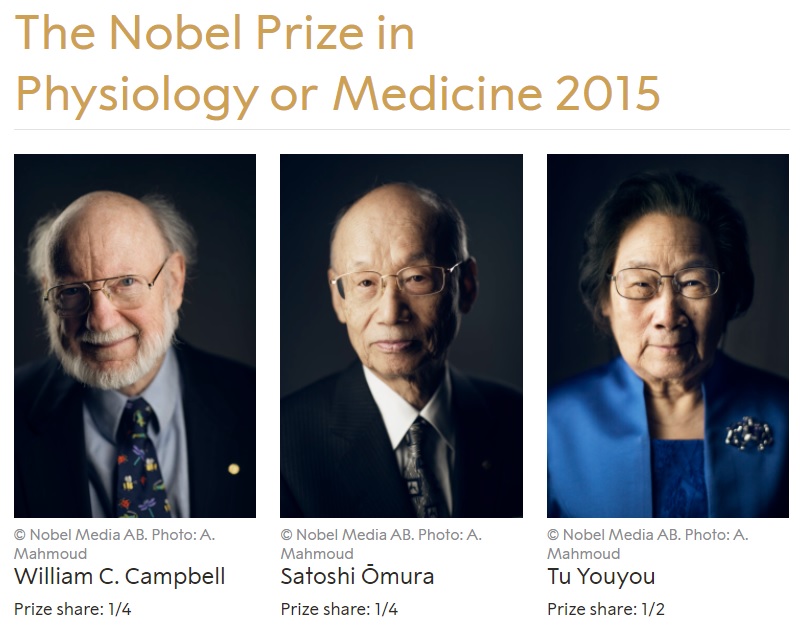
The Nobel Prize in Physiology or Medicine 2015 was divided, one half jointly to William C. Campbell and Satoshi Ōmura “for their discoveries concerning a novel therapy against infections caused by roundworm parasites” and the other half to Tu Youyou “for her discoveries concerning a novel therapy against Malaria.”
The Ivermectin Story emphasizes the organic nature of the drug.
William C. Campbell and Satoshi Ōmura were working with ivermectin. Tu Youyou was working with artemisinin.
Sources:
- December 7, 2015. William C. Campbell. “Nobel Lecture — Ivermectin: A Reflection on Simplicity.” Nobel Prize.

https://www.nobelprize.org/prizes/medicine/2015/campbell/lecture/.
Nobel Prize. - December 10, 2015. Hans Forssberg. “Award Ceremony Speech.” Nobel Prize.

https://www.nobelprize.org/prizes/medicine/2015/ceremony-speech/.
Nobel Prize. - “Tu Youyou – Facts.” Nobel Prize.

https://www.nobelprize.org/prizes/medicine/2015/tu/facts/.
Nobel Prize. - October 1, 2015. Ewen Callaway, and David Cyranoski. “Anti-Parasite Drugs Sweep Nobel Prize in Medicine 2015.” Nature 526 (7572): 174–75.

https://doi.org/10.1038/nature.2015.18507.
Research Journal. - October 5, 2015. David Kroll. “2015 Nobel Prize In Medicine Awarded For Discovery Of Malaria, River Blindness Drugs From Nature.” Forbes.

https://www.forbes.com/sites/davidkroll/2015/10/05/2015-nobel-prize-in-medicine-awarded-for-life-saving-malaria-and-roundworm-treatments/.
Magazine. - February 10, 2011. Andy CRUMP, and Satoshi ŌMURA. “Ivermectin, ‘Wonder Drug’ from Japan: The Human Use Perspective.” Proceedings of the Japan Academy. Series B, Physical and Biological Sciences 87 (2): 13–28.

https://doi.org/10.2183/pjab.87.13.
Research Journal. - December 11, 2021. FLCCC. The Ivermectin Story – (Mirror). Dustin Nemos. Runtime: 23:25.

https://www.bitchute.com/video/0al725UuDRQt/.
Video.